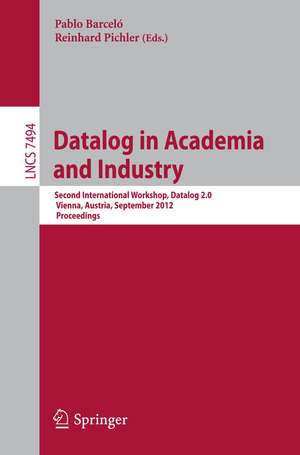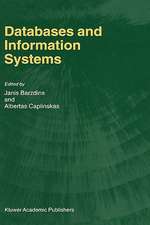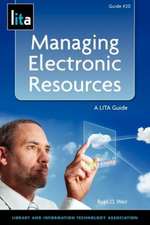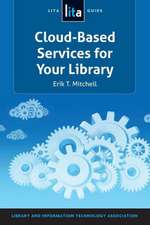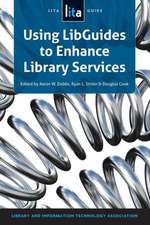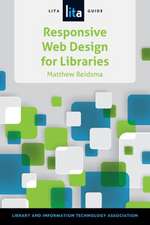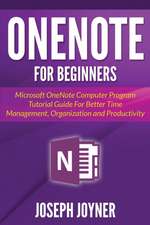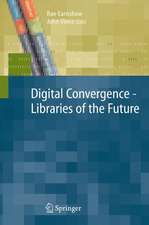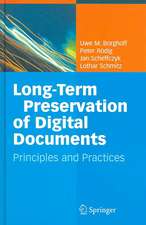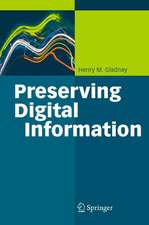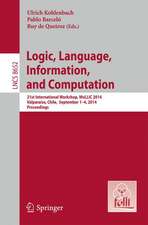Datalog in Academia and Industry: Second International Workshop, Datalog 2.0, Vienna, Austria, September 11-13, 2012, Proceedings: Lecture Notes in Computer Science, cartea 7494
Editat de Pablo Barceló, Reinhard Pichleren Limba Engleză Paperback – 30 iul 2012
The 14 revised full papers presented together with 2 invited talks and 2 invited tutorials were carefully reviewed and selected from 17 initial submissions. Datalog 2.0 is a workshop for Datalog pioneers, implementors, and current practitioners; the contributions aim to bring every participant up-to-date with the newest developments and map out directions for the future.
Din seria Lecture Notes in Computer Science
- 20%
 Preț: 1061.55 lei
Preț: 1061.55 lei - 20%
 Preț: 307.71 lei
Preț: 307.71 lei - 20%
 Preț: 438.69 lei
Preț: 438.69 lei - 20%
 Preț: 645.28 lei
Preț: 645.28 lei -
 Preț: 410.88 lei
Preț: 410.88 lei - 15%
 Preț: 580.46 lei
Preț: 580.46 lei - 17%
 Preț: 427.22 lei
Preț: 427.22 lei - 20%
 Preț: 596.46 lei
Preț: 596.46 lei -
 Preț: 381.21 lei
Preț: 381.21 lei - 20%
 Preț: 353.50 lei
Preț: 353.50 lei - 20%
 Preț: 1414.79 lei
Preț: 1414.79 lei - 20%
 Preț: 309.90 lei
Preț: 309.90 lei - 20%
 Preț: 583.40 lei
Preț: 583.40 lei - 20%
 Preț: 1075.26 lei
Preț: 1075.26 lei - 20%
 Preț: 310.26 lei
Preț: 310.26 lei - 20%
 Preț: 655.02 lei
Preț: 655.02 lei - 20%
 Preț: 580.93 lei
Preț: 580.93 lei - 20%
 Preț: 340.32 lei
Preț: 340.32 lei - 15%
 Preț: 438.59 lei
Preț: 438.59 lei - 20%
 Preț: 591.51 lei
Preț: 591.51 lei - 20%
 Preț: 649.49 lei
Preț: 649.49 lei - 20%
 Preț: 337.00 lei
Preț: 337.00 lei -
 Preț: 449.57 lei
Preț: 449.57 lei - 20%
 Preț: 607.39 lei
Preț: 607.39 lei - 20%
 Preț: 1024.44 lei
Preț: 1024.44 lei - 20%
 Preț: 579.30 lei
Preț: 579.30 lei - 20%
 Preț: 763.23 lei
Preț: 763.23 lei - 20%
 Preț: 453.32 lei
Preț: 453.32 lei - 20%
 Preț: 575.48 lei
Preț: 575.48 lei - 20%
 Preț: 585.88 lei
Preț: 585.88 lei - 20%
 Preț: 825.93 lei
Preț: 825.93 lei - 20%
 Preț: 763.23 lei
Preț: 763.23 lei - 17%
 Preț: 360.19 lei
Preț: 360.19 lei - 20%
 Preț: 1183.14 lei
Preț: 1183.14 lei - 20%
 Preț: 340.32 lei
Preț: 340.32 lei - 20%
 Preț: 504.57 lei
Preț: 504.57 lei - 20%
 Preț: 369.12 lei
Preț: 369.12 lei - 20%
 Preț: 583.40 lei
Preț: 583.40 lei - 20%
 Preț: 343.62 lei
Preț: 343.62 lei - 20%
 Preț: 350.21 lei
Preț: 350.21 lei - 20%
 Preț: 764.89 lei
Preț: 764.89 lei - 20%
 Preț: 583.40 lei
Preț: 583.40 lei -
 Preț: 389.48 lei
Preț: 389.48 lei - 20%
 Preț: 341.95 lei
Preț: 341.95 lei - 20%
 Preț: 238.01 lei
Preț: 238.01 lei - 20%
 Preț: 538.29 lei
Preț: 538.29 lei
Preț: 299.63 lei
Preț vechi: 374.54 lei
-20% Nou
Puncte Express: 449
Preț estimativ în valută:
57.33€ • 60.01$ • 47.72£
57.33€ • 60.01$ • 47.72£
Carte tipărită la comandă
Livrare economică 31 martie-14 aprilie
Preluare comenzi: 021 569.72.76
Specificații
ISBN-13: 9783642329241
ISBN-10: 3642329241
Pagini: 208
Ilustrații: XIV, 191 p. 20 illus.
Dimensiuni: 155 x 235 x 15 mm
Greutate: 0.3 kg
Ediția:2012
Editura: Springer Berlin, Heidelberg
Colecția Springer
Seriile Lecture Notes in Computer Science, Information Systems and Applications, incl. Internet/Web, and HCI
Locul publicării:Berlin, Heidelberg, Germany
ISBN-10: 3642329241
Pagini: 208
Ilustrații: XIV, 191 p. 20 illus.
Dimensiuni: 155 x 235 x 15 mm
Greutate: 0.3 kg
Ediția:2012
Editura: Springer Berlin, Heidelberg
Colecția Springer
Seriile Lecture Notes in Computer Science, Information Systems and Applications, incl. Internet/Web, and HCI
Locul publicării:Berlin, Heidelberg, Germany
Public țintă
ResearchCuprins
Paraconsistent Modular Answer Set Programming.- A Retrospective on Datalog 1.0.- LogicBlox, Platform and Language: A Tutorial.- Datalog: A Perspective and the Potential.- Existential Rules: A Graph-Based View.- How (Well) Do Datalog, SPARQL and RIF Interplay?.- Magic-Sets for Datalog with Existential Quantifiers.- On the CRON Conjecture.- Order in Datalog with Applications to Declarative Output.- A Broad Class of First-Order Rewritable Tuple-Generating Dependencies.- Datalog Development Tools.- Query Rewriting Using Datalog for Duplicate Resolution.- Reasoning about Knowledge in Distributed Systems Using Datalog.- Declarative Datalog Debugging for Mere Mortals.- Inconsistency-Tolerant Query Rewriting for Linear Datalog+/– .- Confluence Analysis for Distributed Programs: A Model-Theoretic Approach.- Business Network Reconstruction Using Datalog.- Data Exchange in Datalog Is Mainly a Matter of Choice.- Optimizing Large-Scale Semi-Na¨ıve Datalog Evaluation in Hadoop.- Logical Foundations of Continuous Query Languages for Data Streams.
A Retrospective on Datalog 1.0.- LogicBlox, Platform and Language: A Tutorial.- Datalog: A Perspective and the Potential.- Existential Rules: A Graph-Based View.- How (Well) Do Datalog, SPARQL and RIF Interplay?.- Magic-Sets for Datalog with Existential Quantifiers.- On the CRON Conjecture.- Order in Datalog with Applications to Declarative Output.- A Broad Class of First-Order Rewritable Tuple-Generating Dependencies.- Datalog Development Tools.- Query Rewriting Using Datalog for Duplicate Resolution.- Reasoning about Knowledge in Distributed Systems Using Datalog.- Declarative Datalog Debugging for Mere Mortals.- Inconsistency-Tolerant Query Rewriting for Linear Datalog+/– .- Confluence Analysis for Distributed Programs: A Model-Theoretic Approach.- Business Network Reconstruction Using Datalog.- Data Exchange in Datalog Is Mainly a Matter of Choice.- Optimizing Large-Scale Semi-Na¨ıve Datalog Evaluation in Hadoop.- Logical Foundations of Continuous Query Languages for Data Streams.
A Retrospective on Datalog 1.0.- LogicBlox, Platform and Language: A Tutorial.- Datalog: A Perspective and the Potential.- Existential Rules: A Graph-Based View.- How (Well) Do Datalog, SPARQL and RIF Interplay?.- Magic-Sets for Datalog with Existential Quantifiers.- On the CRON Conjecture.- Order in Datalog with Applications to Declarative Output.- A Broad Class of First-Order Rewritable Tuple-Generating Dependencies.- Datalog Development Tools.- Query Rewriting Using Datalog for Duplicate Resolution.- Reasoning about Knowledge in Distributed Systems Using Datalog.- Declarative Datalog Debugging for Mere Mortals.- Inconsistency-Tolerant Query Rewriting for Linear Datalog+/– .- Confluence Analysis for Distributed Programs: A Model-Theoretic Approach.- Business Network Reconstruction Using Datalog.- Data Exchange in Datalog Is Mainly a Matter of Choice.- Optimizing Large-Scale Semi-Na¨ıve Datalog Evaluation in Hadoop.- Logical Foundations of Continuous Query Languages for Data Streams.
Textul de pe ultima copertă
This book constitutes the refereed proceedings of the Second International Workshop on Datalog 2.0, held in Vienna, Austria, in September 2012.
The 14 revised full papers presented together with 2 invited talks and 2 invited tutorials were carefully reviewed and selected from 17 initial submissions. Datalog 2.0 is a workshop for Datalog pioneers, implementors, and current practitioners; the contributions aim to bring every participant up-to-date with the newest developments and map out directions for the future.
The 14 revised full papers presented together with 2 invited talks and 2 invited tutorials were carefully reviewed and selected from 17 initial submissions. Datalog 2.0 is a workshop for Datalog pioneers, implementors, and current practitioners; the contributions aim to bring every participant up-to-date with the newest developments and map out directions for the future.
Caracteristici
Fast track conference proceedings Unique visibility State of the art reseach
